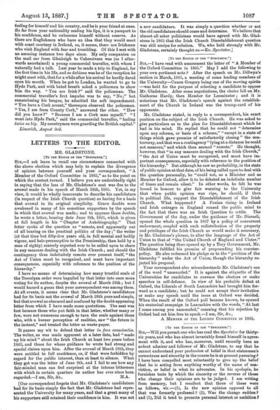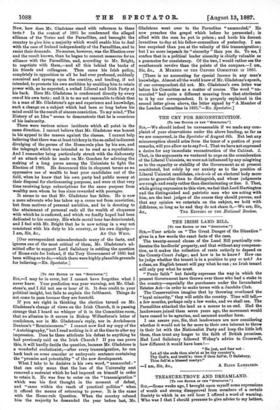[ TO THE EDITOR OF THE 131PECTATOR.")
you permit one who has read the Spectator for thirty- six years, and who has almost invariably found himself in agree- ment with it, and who has, moreover, until recently been an ardent admirer and follower of Mr. Gladstone, to say that he cannot understand your profession of belief in that statesman's earnestness and sincerity in the course he is at present pursuing P I have been compelled most reluctantly to give up the belief that he is acting from anything worthy of the name of con- victim, or belief in what he advocates. In his apologia, he furnishes tests by which the sincerity or the reverse of those who change their opinions are to be judged. I am writing from memory, but I recollect that three of theme were as follows, viz :—(1), Is the new opinion opposed to all that was formerly professed ? (2), Was the change sadden I, and (3), Did it tend to promote personal interest or ambition? Now, how does Mr. Gladstone stand with reference to these tests P In the contest of 1885 he condemned the alleged alliance of the Tories and the Parnellites, and besought the country to give him a majority which would enable him to deal with the case of Ireland independently of the Parnellites, and to resist their demands. No sooner, however, was the Election over and the result known, than he began to concoct measures for an alliance with the Parnellites, and, according to Mr. Bright, to negotiate with them,—and all this behind the backs of his friends and colleagues. Then came his Irish policy, completely in opposition to all he had ever professed, suddenly conceived and sprung upon the country, and tending, if not intended, to promote his own ambition by enabling him to retain power with, as be expected, a united Liberal and Irish Party at his back. Here Mr. Gladstone is condemned directly by every one of his own tests ; and it is to me not reasonable to think that in a man of Mr. Gladetone's age and experience and knowledge, such a change on a subject which had been so long before his mind could be the result of sincere conviction. To my mind," The History of an Idea" seems to demonstrate that he is conscious of his insincerity.
There were various minor incidents which all point in the same direction. I cannot believe that Mr. Gladstone was honest in his appeal to the masses against the classes. I cannot help believing that there was at least trickery in the so-called indiscreet divulging of the germs of the Home-rnle plan by his son, and the telegraph which was intended so be read as a repudiation. And I remember being particularly struck with the dishonesty of an attack which he made on Mr. Goschen for advising the making of a long purse among the Unionists to fight the Election of 1886. He denounced this in eloquent terms as an oppressive use of wealth to beat poor candidates out of the field, when he knew that his own party had public money at their disposal for electioneering purposes, and were at that very time receiving large subscriptions for the same purpose from wealthy men whom he has since rewarded with peerages.
It seems to me that Mr. Gladstone has fallen. He is now a mere advocate who has taken up a cause not from conviction, but from motives of personal ambition, and be is devoting to the attainment of personal ends all the wealth of eloquence with which he is endowed, and which we fondly hoped had been dedicated to his country. His whole moral tone has deteriorated, and I feel with Mr. Bright that he is now acting in a way not consistent with his duty to his country, or his own dignity.— [Our correspondent misunderstands many of the facts, and ignores one of the most critical of them, Mr. Gladstone's ad- mitted offer to support Lord Salisbury in settling the question of Home-rule for Ireland, if the Tory Government of 1885 had been willing so to do,—which there were highly plausible grounds for believing.—En. Spectator.]



































 Previous page
Previous page